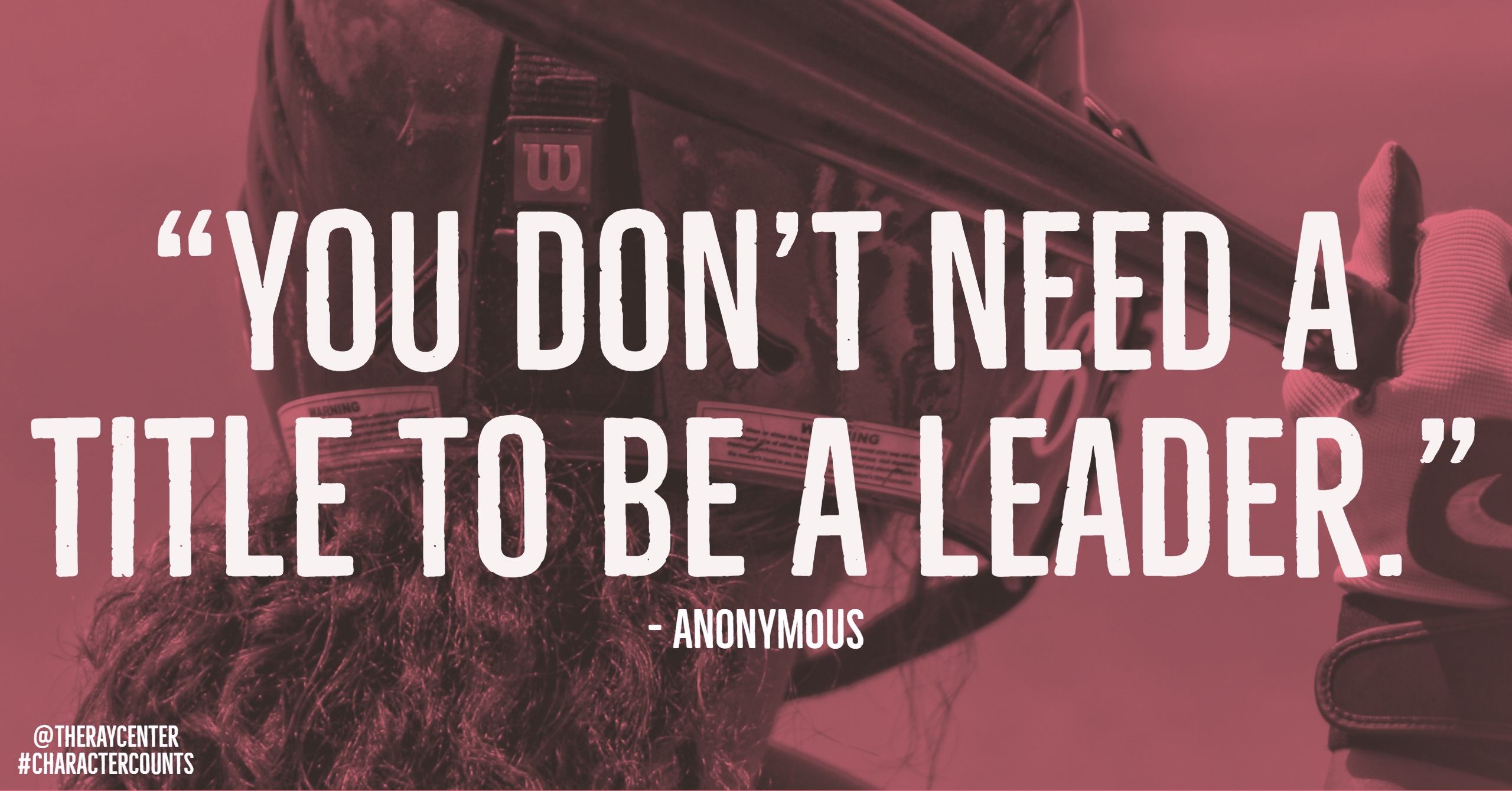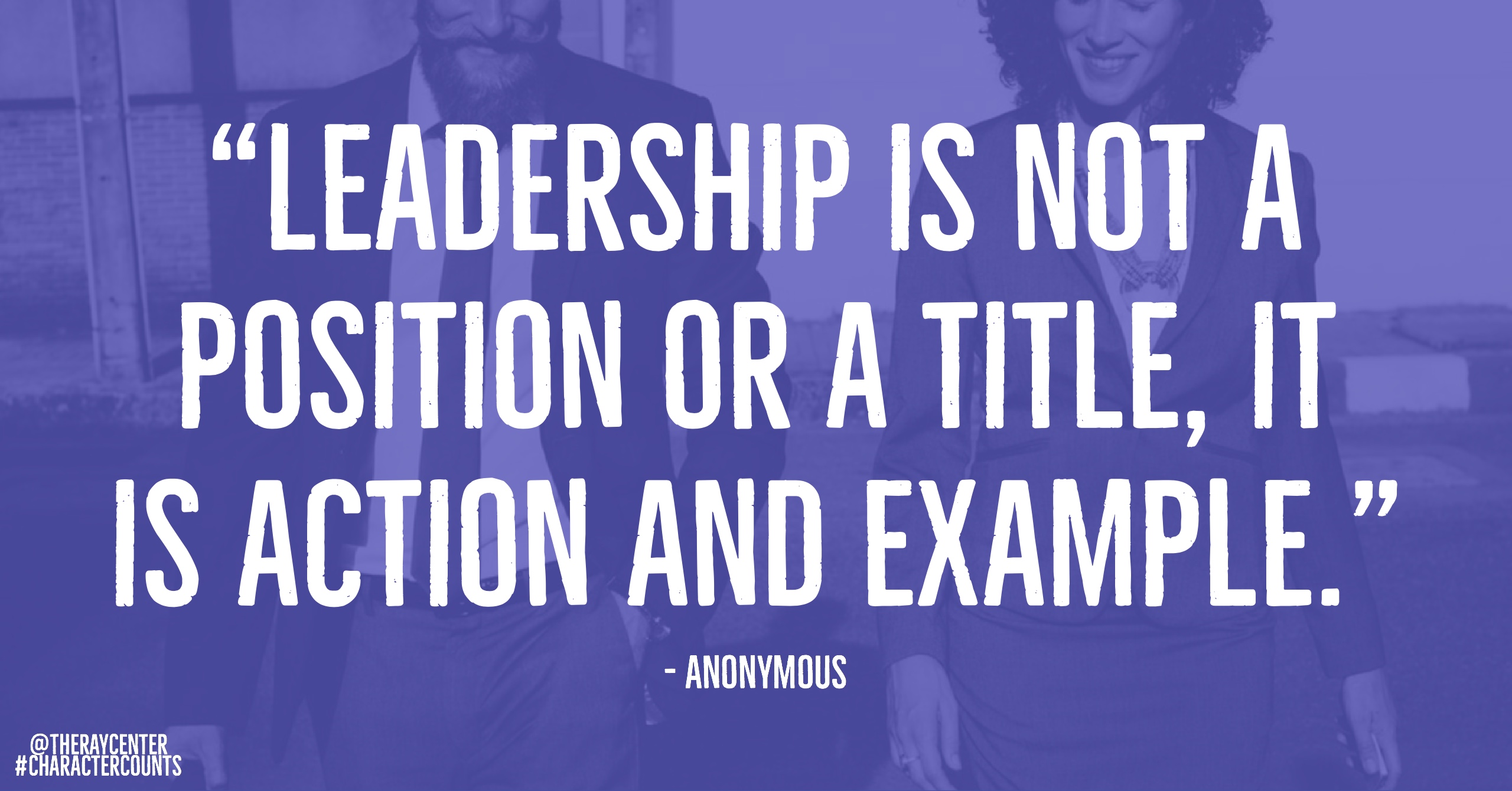The importance of good manners
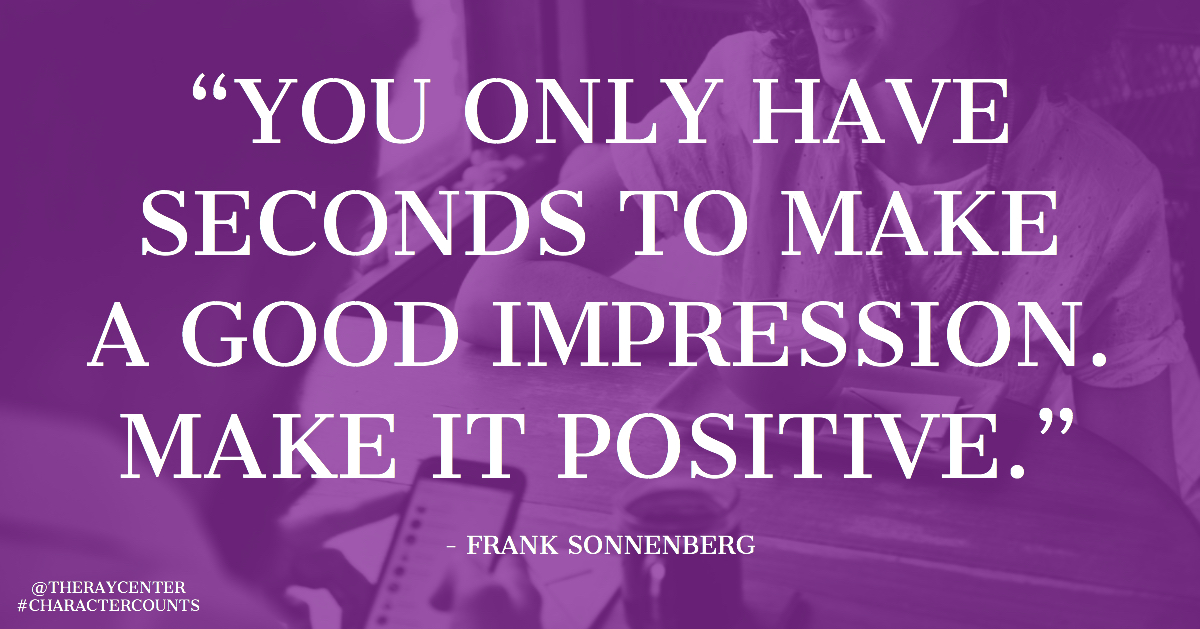
Can you read people’s minds? It’s not really that hard. What do people think when they see someone eat with their mouth open, slam the door in someone’s face, cut someone off in the middle of a sentence, shout across the room, use foul language, look like a slob, bark orders instead of saying “please” and “thank you” … and the list goes on. They’re probably thinking “He has no manners; she should know better. What a loser.” (Ouch.)
Manners certainly count when you’re interviewing for a job, meeting your significant other’s parents for the first time, or having lunch with an important customer. But manners also count even when there’s no special occasion. Although friends and colleagues may not say anything, they absolutely notice, and probably judge, how you behave every day. You’d know that if you could read their minds.
Why Should You Care About Manners?
Knowing where to place your fork and knife doesn’t mean that you have good manners. Having proper manners simply means that your behavior is socially acceptable; you know how to behave so that you don’t embarrass yourself or worse yet, cause others to feel uncomfortable.
Why should you care about manners? The consequences are huge.
- Show what you’re made of. Good or bad manners say volumes about you and your upbringing. Manners show politeness and demonstrate an awareness of self-worth, respect for others, and a desire to fit in.
- Make a good impression. You only have seconds to make a good impression. Make it positive. Remember to have a firm handshake, give your undivided attention, look him or her in the eye when you’re speaking, and listen till they’re finished before responding. Dress for success, but also remember your manners.
- Give of yourself. Manners shift the attention from you toward others. Manners are a good way for you to show gratitude, display respect, and demonstrate kindness.
- Demonstrate trustworthy behavior. Good manners are a strong indication of how you’ll behave in the future. They indicate whether you’re dependable, reliable, and selfless. These are critical elements in building trusting personal and business relationships. People who are rude, inconsistent, or selfish ultimately suffer the consequences.
- Do yourself proud. People are judged by the company they keep. So folks may be asking themselves, “Do we want to be associated with this person?” “Would we be proud to have this person represent our organization?” “Will this individual be a good fit with our team?”
- Stand out among your peers. All things being equal, good manners can set you apart from the crowd. Manners can be an important factor in achieving success.
- Set an example. If you’re a parent, teacher, coach, religious leader, or manager, you’re influencing people every day. Make a conscious effort to be a good role model.
What Do Your Manners Say About You?
Some folks with poor manners offer the excuses, “I never learned” or “I don’t have the time.” Yet others, with huge egos, may think, “I’m the boss. Manners don’t apply to me.” The fact is, it doesn’t take more effort to show your appreciation nor does it require more time to be pleasant. Good manners help make folks feel good about themselves, as well as help make others feel good about you.
Most people know how to put on a show when a situation matters; the key is to behave properly even when it doesn’t. The truth is, when behaviors are repeated again and again, they turn into habits. And old habits die hard. Manners matter. As Laurence Sterne, the author, said, “Respect for ourselves guides our morals; respect for others guides our manners.” Don’t wait for someone to remind you, or worse, don’t learn from an embarrassing situation –– all it requires is a conscious choice. So next time you’re deciding whether to wait your turn, respond in a timely fashion, or keep someone waiting … Mind your manners!
This is adapted from BOOKSMART: Hundreds of real-world lessons for success and happiness by Frank Sonnenberg released November 2016.
 Frank is an award-winning author. He has written six books and over 300 articles. Frank was recently named one of “America’s Top 100 Thought Leaders” and one of America’s Most Influential Small Business Experts. Frank has served on several boards and has consulted to some of the largest and most respected companies in the world. Additionally, FrankSonnenbergOnline was named among the “Best 21st Century Leadership Blogs,” among the “Top 100 Socially-Shared Leadership Blogs,” and one of the “Best Inspirational Blogs On the Planet.” Frank’s new book, BookSmart: Hundreds of real-world lessons for success and happiness was released November 2016. © 2018 Frank Sonnenberg. All rights reserved.
Frank is an award-winning author. He has written six books and over 300 articles. Frank was recently named one of “America’s Top 100 Thought Leaders” and one of America’s Most Influential Small Business Experts. Frank has served on several boards and has consulted to some of the largest and most respected companies in the world. Additionally, FrankSonnenbergOnline was named among the “Best 21st Century Leadership Blogs,” among the “Top 100 Socially-Shared Leadership Blogs,” and one of the “Best Inspirational Blogs On the Planet.” Frank’s new book, BookSmart: Hundreds of real-world lessons for success and happiness was released November 2016. © 2018 Frank Sonnenberg. All rights reserved.
Attitude and actions
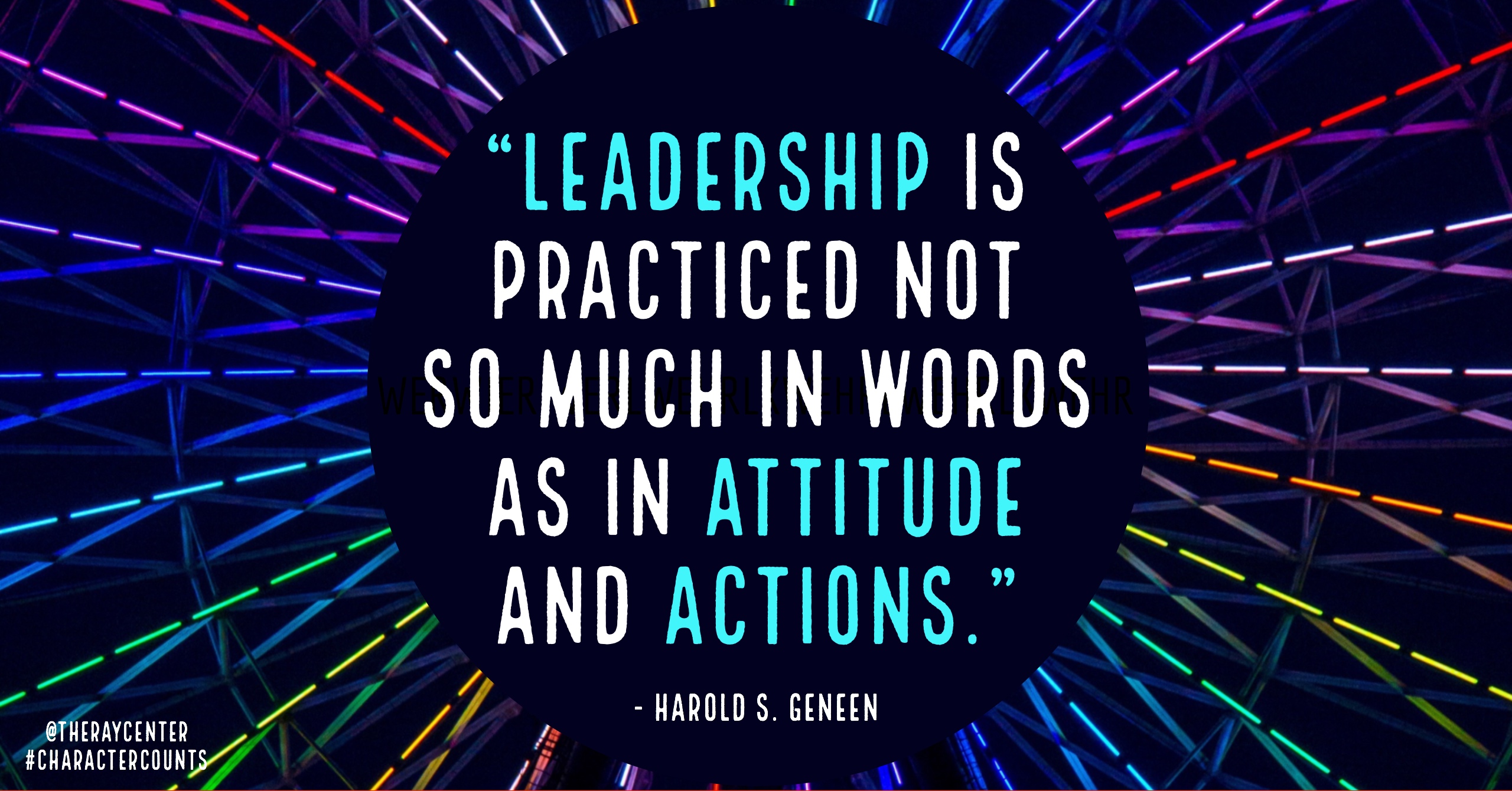
Do you shoot from the hip?

From our guest contributor, Frank Sonnenberg.
All too often, people who shoot from the hip, and succeed, are greeted with admiration. Their success is viewed as a magical ability to ignore hard work, hope for the best, and still come out on top. To them, winging it is a way of life.
Winging it is a form of shooting craps. You gamble that, prepared or not, you’ll be able to handle whatever comes up in life — sevens or snake eyes. But even veteran gamblers recognize that the odds are stacked against them. Taking a calculated risk is not the same as gambling. One is taking a risk after considered judgment; the other is leaving everything to the roll of the dice.
Originally, the term “winging it” was used to describe actors who relied on prompters in the wings because they never took the time to learn their lines. Winging it, or bluffing, certainly didn’t enhance the reputation of the actor who was performing without adequate preparation. And it won’t help you.
“Winging it is nothing more than a gamble.”
– Frank Sonnenberg
You may have confidence in your ability to make off-the-cuff decisions; indeed, winging it may even be a habit, one you have little desire to break because it hasn’t created a major problem for you — yet.
The fact is, it’s impossible to substitute winging it for planning, preparation, and practice. When people wing it, they hope everything will work out, but they don’t know that it will. As a result of laziness or a tendency to operate on automatic pilot, they forget that making things work takes work. As Jascha Heifetz, the renowned violinist, said, “If I don’t practice one day, I know it; two days, the critics know it; three days, the public knows it.”
Practicing the basics, being prepared, and following up on details is a small price to pay for success. Crisis management — putting out fires all day long — is more expensive and it’s exhausting. Winging it wastes valuable time and energy, leads to a loss of credibility, and can damage even the most promising career.
Of course, there will always be unpleasant surprises to deal with because the world isn’t perfect. But you can reduce the number of crises that plague you (and the stress they cause) by maintaining discipline in areas that are controllable.
How do you stop this runaway freight train and gain control of your life? The answer is as simple as an old Chinese proverb: “A journey of a thousand miles begins with a single step.”
Since winging it has much in common with gambling, the first step is to follow the precept that Gamblers Anonymous requires of new members: Admit that you’re a gambler. Once you see yourself as a gambler (rather than an astute, risk-taking person), you’ve taken that first important step. When you’ve convinced yourself that you must break out of your winging-it, shoot-from-the-hip, flip-a-coin mentality, you’ll have a new lease on life. Once you incorporate some planning and preparation into your life, I’m sure you’ll find that the investment leads to better, more reliable outcomes. Is it worth the effort? You bet!
For more resources about how to be successful through responsible planning, click here!
This is adapted from BOOKSMART: Hundreds of real-world lessons for success and happiness by Frank Sonnenberg released November 2016.
 Frank is an award-winning author. He has written six books and over 300 articles. Frank was recently named one of “America’s Top 100 Thought Leaders” and one of America’s Most Influential Small Business Experts. Frank has served on several boards and has consulted to some of the largest and most respected companies in the world. Additionally, FrankSonnenbergOnline was named among the “Best 21st Century Leadership Blogs,” among the “Top 100 Socially-Shared Leadership Blogs,” and one of the “Best Inspirational Blogs On the Planet.” Frank’s new book, BookSmart: Hundreds of real-world lessons for success and happiness was released November 2016. © 2018 Frank Sonnenberg. All rights reserved.
Frank is an award-winning author. He has written six books and over 300 articles. Frank was recently named one of “America’s Top 100 Thought Leaders” and one of America’s Most Influential Small Business Experts. Frank has served on several boards and has consulted to some of the largest and most respected companies in the world. Additionally, FrankSonnenbergOnline was named among the “Best 21st Century Leadership Blogs,” among the “Top 100 Socially-Shared Leadership Blogs,” and one of the “Best Inspirational Blogs On the Planet.” Frank’s new book, BookSmart: Hundreds of real-world lessons for success and happiness was released November 2016. © 2018 Frank Sonnenberg. All rights reserved.
To lead the orchestra
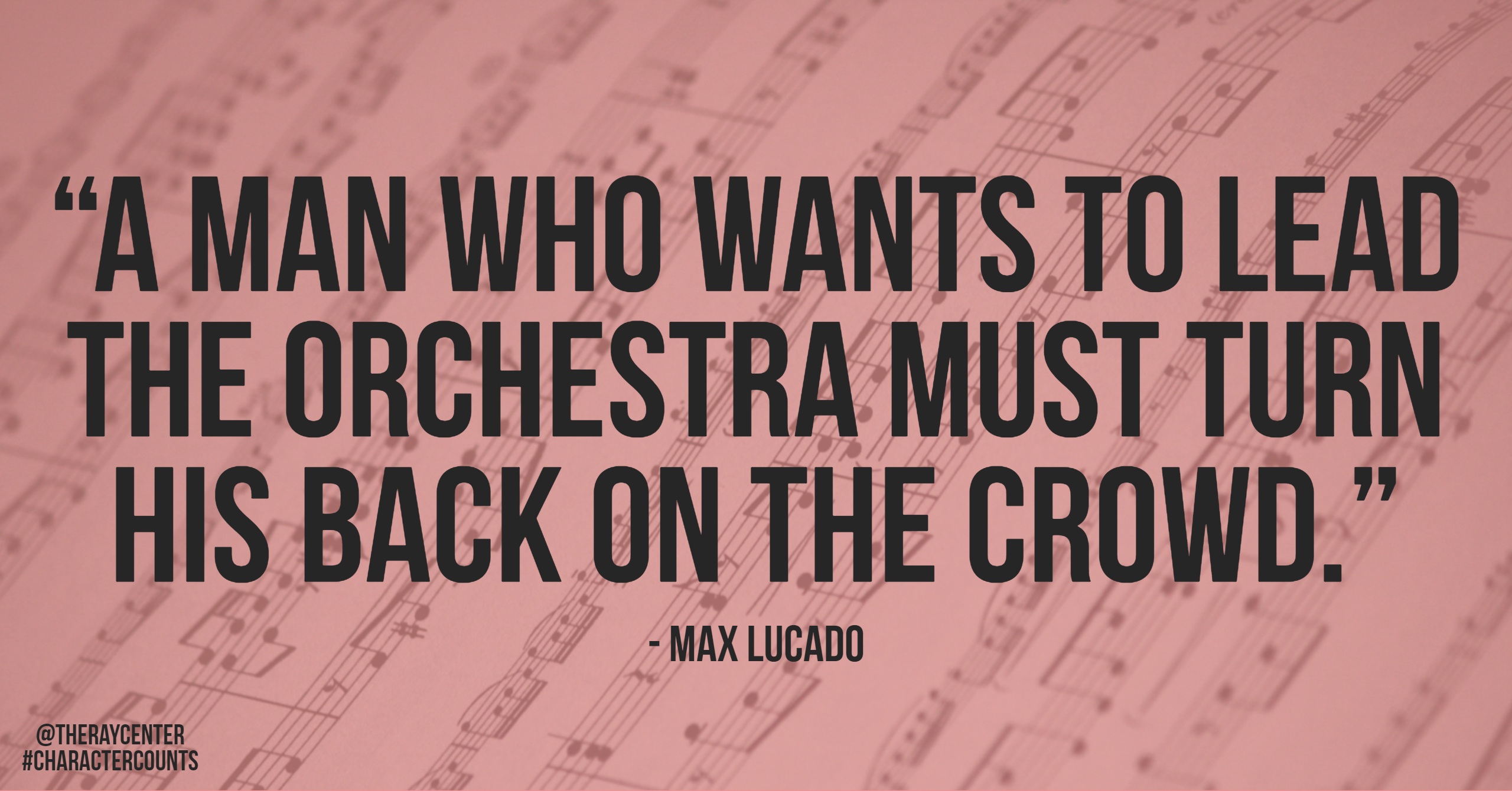
Be a leader
How to be a great teammate
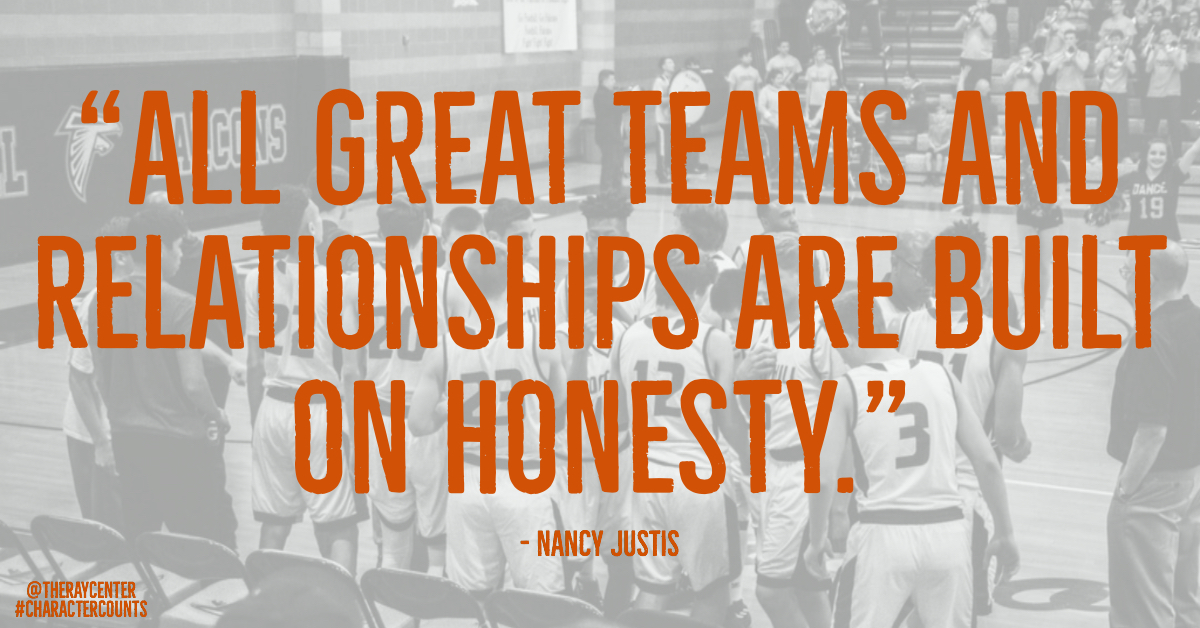
From our guest contributor, Nancy Justis.
Not every basketball player has been blessed with great talent, but every player, regardless of ability can be a great teammate. Here are 11 qualities of a great teammate. Do these qualities describe your or your young player?
1) A great teammate gives relentless effort: Remember, your coach should not have to coach effort! You cannot control many things that will happen during your basketball season, but you can control how hard you play. The only way to get better is to give your maximum effort. This not only makes you better, it pushes your teammates to get better as well.
2) A great teammate is unselfish: Put the team first. Your job is to do what it takes to help the team be successful. This isn’t always easy, but great teammates find a way to put the success of the team above their own success.
3) A great teammate is honest: All great teams and relationships are built on honesty. Your coach and teammates need to know that they can trust you during the ups and downs of a season.
4) A great teammate is humble: Basketball is a team sport. You may be the star of your team or you may be a role player, either way, remember that the team comes first. Put your individual accomplishments aside and give praise to your teammates. Teams succeed when no one cares who gets the credit.
5) A great teammate holds themselves and their teammates accountable: You should have high standards for yourself and your teammates. If a teammate is not fulfilling duty to the team you can’t be afraid to confront them and get them back on track. You might need to help them buy in to a particular strategy or help them accept their role on the team. Don’t accept a negative attitude from teammates, be the player that reaches out to them to help your team as a whole.
6) A great teammate strives to improve: You can always be a better player tomorrow than you are today. Work to improve your game and you will lift your teammates. Stay and work after practice and see how many teammates start to join you.
7) A great teammate is optimistic: Don’t be a player constantly complaining to others about what’s wrong. Look for the positives in your teammates and coaches
8) A great teammate has respect for others: Respect your teammates. Respect your coaches. Respect your family, Respect your teachers. Respect your facilities. Respect your school. Look people in the eye. Nod and acknowledge your coach when they are addressing you. Clean up after yourself. Be polite. Encourage and cheer on your teammates. Help create a culture of mutual respect.
9) A great teammate is a leader: You don’t have to be the best player on your team to be a leader. You don’t even need to be a vocal leader. Every player can lead by their actions. Is what you do on a daily basis making your team better? Challenge your teammates during drills. You’ll improve and so will they. Bring energy to every practice. Don’t talk bad about teammates or coaches outside the team environment. These are all ways you can lead your teammates towards success
10) A great teammate is resilient: Help your team use temporary setbacks or losses as an opportunity to grow and improve. Don’t make excuses, look for solutions. As a mentally tough basketball player, pride yourself on being resilient. Your ability to bounce back will be infectious and help make your entire team more resilient. In any situation, one player’s positive outlook can make a difference. Try to be that player.
11) A great teammate helps foster a family atmosphere: Support your teammates like family. Your season is going to have highs and lows, so are your teammates. Teams that build close relationships are usually the teams having the most fun and having the most success.
All of your actions, within and away from the team, are a representation of your team, your school or organization, and your family. Take responsibility for your behavior and actions at all times. Conduct yourself in such a way that your parents, coaches, and teachers would be proud of you. You never know who is looking at you for cues on how to behave.
Coaches – This is a key point for you to remember as well. Your young players are looking at you to see how you behave. This includes your interactions with players, officials, and other coaches. Be the person you want your players to be. Actions speak louder than words.
 Nancy Justis has over 40 years of journalistic experience ranging from newspaper and magazine writing and editing, to collegiate public relations. At a time when women were a virtual non-entity in the athletics media relations field, she blazed the trail. She has over 30 years of experience in the promotion of sports teams and working with student-athletes. She was Sports Information Director/Assistant Athletics Director for Media Relations at the University of Northern Iowa for most of those years, publicizing the Panthers’ nationally-recognized men’s basketball and football teams. She is a member of the Cedar Valley Character Counts Committee and serves on the board of the Cedar Valley Sports Commission. She freelance writes for various publications.
Nancy Justis has over 40 years of journalistic experience ranging from newspaper and magazine writing and editing, to collegiate public relations. At a time when women were a virtual non-entity in the athletics media relations field, she blazed the trail. She has over 30 years of experience in the promotion of sports teams and working with student-athletes. She was Sports Information Director/Assistant Athletics Director for Media Relations at the University of Northern Iowa for most of those years, publicizing the Panthers’ nationally-recognized men’s basketball and football teams. She is a member of the Cedar Valley Character Counts Committee and serves on the board of the Cedar Valley Sports Commission. She freelance writes for various publications.
Action and example
Are you busy to a fault?
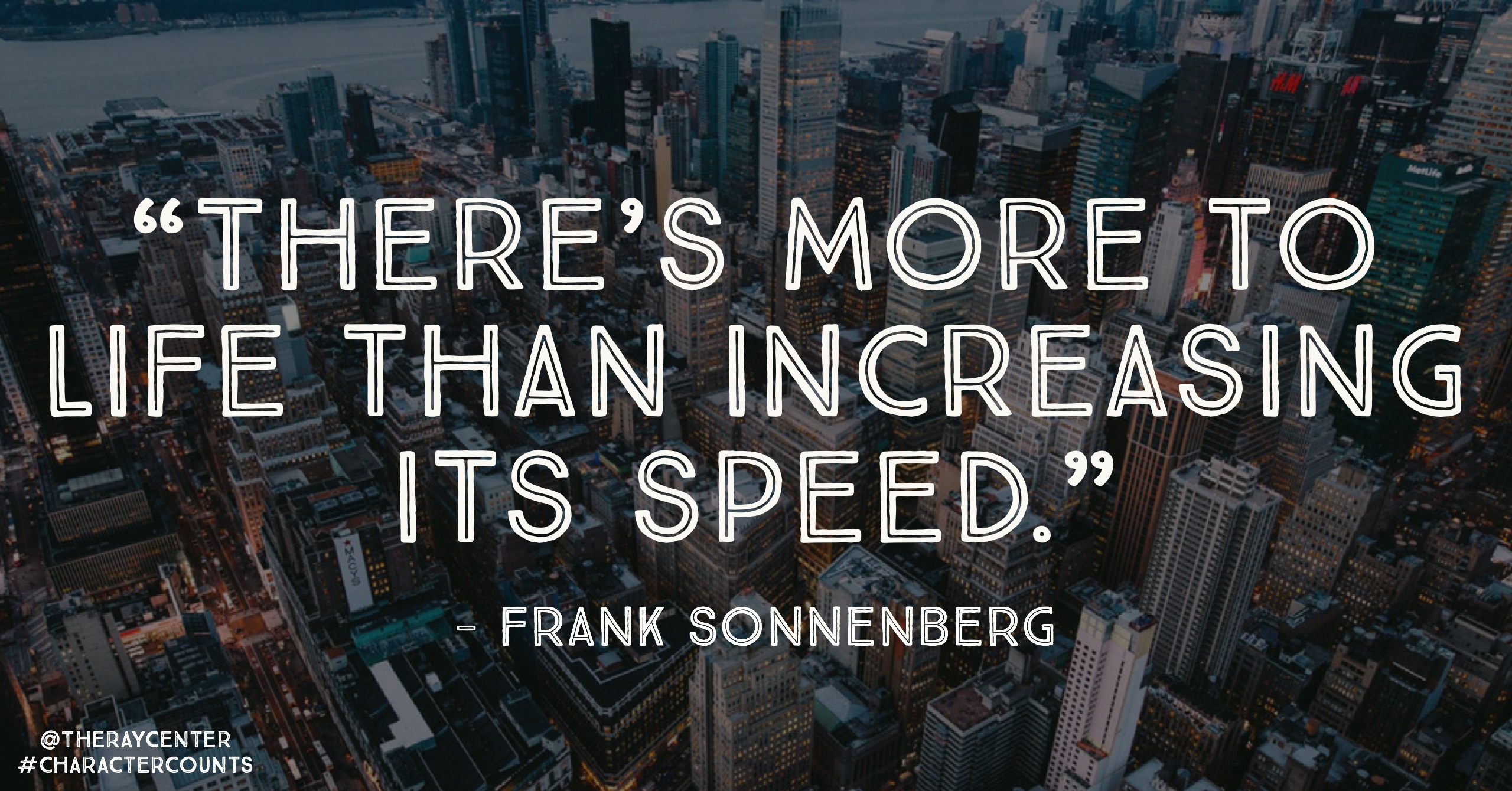
From our guest contributor, Frank Sonnenberg.
In today’s wonderful world of time-saving technologies, you’d think we’d be beneficiaries of an improved quality of life. More time for friends and family, more time to pursue personal interests, and more time to follow our dreams. Wrong! (So much for living in the fast lane.)
Despite these continuing advances, time saved has become time filled. Bombarded with added responsibilities, working families are faced with greater demands and obligations, increased stress levels, and tough choices to make between personal and professional commitments. In many cases, instead of living life to the fullest, we’re living life on the edge — cramming as much as we can into a day, scrambling to get ahead, and running rampant on what sometimes seems to be a never-ending pursuit of the almighty buck.
This is life now that hyper-speed Internet communication has connected us to the demands of a hyper-speed world. One where tomorrow is not good enough for answers needed today. One where the pace of life that we once knew has changed forevermore, slamming us into high gear — full rev…with no time for idling. And often, no time for breathing.
Too often, our “must-do” lists do not include doing something for ourselves. Like hamsters, we live on a non-stop treadmill running pointlessly to nowhere, as moments pass us by. The scene of the “Norman Rockwell family” gathered together around the table has, in many instances, been replaced with that of working parents struggling to make ends meet. And children are being raised by others while we embrace a frantic daily work ritual. In short, we are becoming “absentee parents,” losing opportunities to spend quality time with our children.
This is life.
Or, perhaps better stated…this is life?
Sadly, we are losing the priceless things that we once treasured. An extra hour or two to putter around the house, the joy of watching a child’s first steps, or taking time to make our favorite chocolate chip cookies from scratch using grandma’s recipe. And — home-cooked meals? Who has the time?
Today, those home-cooked meals we once enjoyed have been replaced by take-out dinners or a quick stop at the drive-through window. Family meals around the table have been reduced to grabbing a bite with anyone who happens to be home at the time, rather than “being a family” at least once during the day. Family conversations are fast disappearing, and what once was quality family time has now evolved to a drone-like fixation on a mega-sized TV screen, fighting for possession of the remote.
Even those special occasions we once anticipated and celebrated have been reduced in significance. For example, many holidays have become over-commercialized, and we find ourselves looking at them as “days off,” rather than pausing to reflect on their true meaning and sharing them as a family, as a community, and as a united nation. And the care and time once spent thinking about buying, or making, just the right gift has, in many cases, been replaced with gift certificates — that is, if we can remember the occasion in the first place. These pleasures are often lost in the blur of living life in the fast lane, gone because we fail to hit the pause button and put our lives back into perspective. In many cases, we’re becoming worker ants with tunnel vision.
The sobering fact is that there will come a point in time when we sit back, or more likely collapse in exhaustion, wondering what we’ve gained from this frenetic race called life. And in those moments of retrospection, will we really regret that missed promotion, the rejected proposal, or not being able to buy the bigger house? Or will we ponder our failed relationships — the feelings left unshared with someone we love, or the precious time lost with our children? Sadder yet, will we find ourselves living in a society where future generations accept these values as the norm?
Attention, Fellow Homo sapiens!
This is your wake-up call before it’s too late — the early warning signal to get a perspective on the things that matter.
Make time for yourself — if only just a few minutes — to reflect and regain some perspective — where you can redirect, realign, and realize a better, more rewarding life.
As authors, we find that we, too, are very much a part of this hyper-speed lifestyle that we’re all living. We’re no better than the next hardworking parent or individual trying to keep it all together. But, in our quieter moments, we do realize that there is a need to slow down…to put on the brakes and consider those values that are most important in life.
So take a moment to replenish your energies, re-establish your priorities, and re-introduce yourself to those things you once held close to your heart. There’s more to life than increasing its speed.
For more information on being conscientious and mindful, click here.
This is adapted from BOOKSMART: Hundreds of real-world lessons for success and happiness by Frank Sonnenberg released November 2016.
 Frank is an award-winning author. He has written six books and over 300 articles. Frank was recently named one of “America’s Top 100 Thought Leaders” and one of America’s Most Influential Small Business Experts. Frank has served on several boards and has consulted to some of the largest and most respected companies in the world. Additionally, FrankSonnenbergOnline was named among the “Best 21st Century Leadership Blogs,” among the “Top 100 Socially-Shared Leadership Blogs,” and one of the “Best Inspirational Blogs On the Planet.” Frank’s new book, BookSmart: Hundreds of real-world lessons for success and happiness was released November 2016. © 2018 Frank Sonnenberg. All rights reserved.
Frank is an award-winning author. He has written six books and over 300 articles. Frank was recently named one of “America’s Top 100 Thought Leaders” and one of America’s Most Influential Small Business Experts. Frank has served on several boards and has consulted to some of the largest and most respected companies in the world. Additionally, FrankSonnenbergOnline was named among the “Best 21st Century Leadership Blogs,” among the “Top 100 Socially-Shared Leadership Blogs,” and one of the “Best Inspirational Blogs On the Planet.” Frank’s new book, BookSmart: Hundreds of real-world lessons for success and happiness was released November 2016. © 2018 Frank Sonnenberg. All rights reserved.
50 ways to be a great example to a child

From our guest contributor, Michele Borba.
Of course we want our children to become good, responsible, respectful and successful human beings! But in our quest to “do it all” we may forget that some of the most powerful ways to help our children aren’t in the things we buy but in the simple things we say. Example is everything. In fact, the Greek philosopher, Aristotle, years ago said that the best way to teach character is by modeling good example. (I swear kids come with video recorders planted inside their heads and we know it when they play us back at the most inopportune moments–usually when the relatives arrive).
The bottom line is the kids are watching us and they are copying us–the good, the bad, and the very ugly. Just in case you need any proof here are a few things our children pick up from watching us:
Behavior. Prejudice. Stress management. How we cope with defeat. Organizational style. Driving safety. Drinking styles. Eating habits. Friendship making. Goal-setting. Values. Sleeping habits. Television viewing. Courtesy. Discourtesy. Punctuality. Religion. Love of reading. Lifestyle choices. Interests. Responsibility. Digital citizenship. If we bounce back. Self-talk. Pessimism. Optimism. Money Management. Procrastination. Frugality. Patriotism. Biases. Friendship keeping. Valuing education. Conflict resolution. And the list goes on and on!
Here are just 50 things to say to boost our own example to our kids so we become the model we hope they copy. Our children need role models. Let them look to us!
1. “Thank you! I really appreciate that!” (Courtesy)
2. “Excuse me, I need to walk away and get myself back in control.” (Stress and anger management)
3. “I’m going to call Grandma and see how she’s doing. She looked lonely.” (Empathy, compassion)
4. “Mrs. Jones is sad. I’m baking her some cookies. Want to help?” (Charity)
5. “I don’t want to watch this anymore. I don’t like how they are portraying…(women, men, kids, a race, a culture, a religion…). (Values and stereotyping)
6. “Excuse me. I didn’t mean to interrupt you.” (Admitting mistakes. Manners)
7. “That’s my two cents. I’d love to hear yours.” (Communication style)
8. “I lost my temper there. I’m going to work on counting to 10 when I get so stressed.” (Anger management)
9. “I blew it. Next time I’ll….” (Handling mistakes)
10. “I’m going to set a goal for myself this year. I’m working on….” (Goal-setting)
11. “I’m so upset with my friend-remind me not to send her an email until I cool off.” (Online behavior)
12. “Please repeat that. I don’t understand.” (Conflict and communication style).
13. “I’m so stressed lately…I’m going to (start walking, eat healthier, write in a journal, listen to soothing music, or whatever) to help me relax.” (Stress management, coping)
14. “I want to listen. Let me turn off my cell phone.” (Digital citizenship)
15. “I have so many things to do today. I’m going to make a list so I don’t forget anything.” (Organization)
16. “That woman looks like she’s going to drop those packages. Let’s ask if she needs help.” (Kindness)
17. “Apologies…that was my fault. Hope you forgive me.” (Forgiveness)
18. “I’m driving and need to keep my eyes on the road. Please turn off my phone for me.” (Driving safety)
19. “I love watching the Oscars, but let’s not focus on their dress designers but their talent. How do you think Sandra Bullock prepared for her role in space.” (Valuing quality over materialism)
20. “She’s my friend and doesn’t want me to tell anyone. I’m honoring her request.” (Friendship. Loyalty)
21. “I’m getting upset and need to take a time out. Let’s talk in a few minutes.” (Anger management)
22. “Great question-I don’t that answer. But I’ll try to find it for you.” (Admitting shortcomings)
23. “They do look different than us, but they have the same feelings. Let’s think about how we’re the same.” (Prejudice)
24. “Didn’t she just move here? Let’s go introduce ourselves and ask her to sit with us.” (Courtesy. Kindness)
25. “If it’s not respectful I’m not sending it.” (Digital citizenship)
26. “But is that true for all elderly people? Aunt Harriet remembers everything and she’s 87. Let’s think of more examples.” (Stopping prejudice and bias)
27. “Every month I’m going to set a new goal. You’re going to help remind me to stick to it!” (Goal-setting)
28. “We hear so much about the “bad” stuff–let’s look through the paper and find the good things people are doing for each other. We could start ‘Good News’ reports.” (Optimism, attitude)
29. “I need to take care of myself and eat healthier.” (Self-care)
30. “I’m going to walk around the block. Want to come? It always helps me relax.” (Self-care)
31. “I taped ‘No’ on a card on the phone to remind me to not to take on so much. I’m prioritizing my family!” (Priorities)
32. “I’ve got to catch my words-I’m becoming too negative.” (Attitude. Optimism)
33. “Let’s set ‘unplugged times’ for our family. What about from 6 to 8 pm?” (Prioritizing family).
34. “I do like it, but I’m going to wait until it’s on sale.” (Frugality, delaying gratification).
35. “I always try to save half of my paycheck.” (Money management)
36. “Those children lost everything in that fire. Let’s go through our closets and find gently used clothes and toys to bring them.” (charity)
37. “I’d love to eat that now, but I’m going to wait until after dinner.” (Self-control)
38. “I know it sounds fun, but I need to finish my job. My motto is, “Work first, then play.” (Responsibility)
39. “Thanks, but no thanks. I’m driving so I can’t drink.” (Drinking behavior)
40. “My favorite thing to do is read! Let’s go to the library sale and find books to bring on our vacation.” (Instilling a love of reading).
41. “Let’s stay open-minded and give Daniel a turn. We didn’t hear his side.” (Non-judgmental)
42. “That’s not fair. We agreed on the rules so let stick to them.” (Fairness).
43. “I know we wanted to win, but we didn’t. They were better than us, so let’s go congratulate them.” (Sportsmanship)
44. “I need to go write a thank you to Peter before I forget. He put a lot of thought into that present and I want to make sure he knows how much I appreciate it.” (Gratitude)
45. “Thanks, but you don’t need to give me any money. I did it because I wanted to help.” (Charitableness)
46. “I’m going to stop talking about dress sizes and jumping on the scale, and start thinking about eating healthier instead.” (Self-image)
47. “I’ve got to get to the polls before they close. Voting is something I take very seriously.” (Citizenship)
48. “Let’s stop and think about how she feels. She looks sad-let’s get in her shoes for a minute.” (Empathy)
49. “I’m not just going to stand by when someone could get hurt. I’m asking if he wants help.” (Responsibility. No by standing!”)
50. “Everyone can make a difference. Let’s think of something we can do.” (Personal responsibility. Empowerment)
What can you say to a child today to be the example he or she can use for tomorrow? Beware, the children are copying!
For more information on how to be a good role model, click here.
 Dr. Michele Borba is an educational psychologist, parenting expert, TODAY show contributor and author of 22 books including The Big Book of Parenting Solutions: 101 Answers to Your Everyday Challenges and Wildest Worries and UnSelfie: Why Empathetic Kids Succeed in Our All-About-Me World.
Dr. Michele Borba is an educational psychologist, parenting expert, TODAY show contributor and author of 22 books including The Big Book of Parenting Solutions: 101 Answers to Your Everyday Challenges and Wildest Worries and UnSelfie: Why Empathetic Kids Succeed in Our All-About-Me World.
Check out: micheleborba.com or follow her on Twitter @micheleborba.

